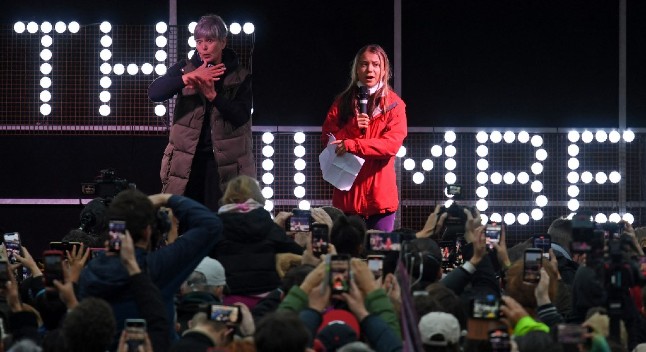“The real work continues outside these halls. And we will never give up, ever,” the figurehead of the Fridays for Future movement posted on Twitter
The #COP26 is over. Here’s a brief summary: Blah, blah, blah.
But the real work continues outside these halls. And we will never give up, ever. https://t.co/EOne9OogiR
— Greta Thunberg (@GretaThunberg) November 13, 2021
On Saturday evening, the UN members states agreed the Glasgow Climate Pact, despite a last-minute intervention by India to change the language on “phasing out” coal to “phasing down” coal.
Alok Sharma, the British minister who led the talks, conceded that it had not come as far as some had hoped.
“We can now say with credibility that we have kept 1.5C alive. But, its pulse is weak and it will only survive if we keep our promises and translate commitments into rapid action,” he said.
“Before this conference, the world asked: do the parties here in Glasgow have the courage to rise to the scale of the challenge? We have responded. History has been made here in Glasgow.”
While the agreement won applause for keeping alive the hope of capping global warming at 1.5C, many of the nearly 200 national delegations wished they had come away with more.
But Thunberg on Twitter cited estimates by the respected Climate Action Tracker, to underline that the world still remained far away from taking the actions required to limit global warming to 1.5C.
2,4°C if all govts met the 2030 targets, 2,7°C with current policies.
These NDCs are based on flawed and underreported numbers. And this is IF leaders meet their promises, which judging by their track record is not very likely…
This is what some seem to celebrate today. #COP26 https://t.co/VNT4bxfPck— Greta Thunberg (@GretaThunberg) November 14, 2021
Other Swedish activists, experts, and politicians were more positive.
Karin Lexén, General Secretary for the Swedish Society For Nature Conservation, told the TT newswire that it was “encouraging that countries had succeeded in reaching agreement”, but warned that “despite important steps forward, the Glasgow Pact is till not a sufficiently robust response to the climate crisis.”
She was positive about the commitment to meet earlier promises to provide climate finance to poorer countries, that the so-called “rulebook” had been finalised and that coal and fossil fuel subsidies had been mentioned in the report. But she said that poorer countries would need still more support to handle climate change, that she would have liked countries to raise their ambitions for emissions reductions.
Johan Rockström, the Swedish professor who leads the Potsdam Institute for Climate Impact Research in Germany, said in a tweet that the deal had put the world on track towards a less catastrophic future, but still left a lot of work yet to do.
“We came to Glasgow following a path to Disaster (2.7°C). We leave Glasgow on a path to Danger (just below 2°C),” he wrote. “Road from Glasgow is more action, more ambition, on finance, equity, 50% targets for 2030 & net-zero by 2050, and nature climate solutions.”



 Please whitelist us to continue reading.
Please whitelist us to continue reading.
Greta is truly moronic and painful to watch.
For starters, Greta can clean up her language. According to numerous press and TV reports from Glasgow she was chanting “whatever the fuck they’re doing” and “you can shove your climate crisis up your arse”. Not the best way to lead an international campaign and gain respect for your words and actions.
Ever think the point is to catch people’s attention? It’s not like decades of politely asking prior generations to not set the world on fire has gotten us anywhere.
Also, choosing to police her language instead of taking the time to hear the actual message is kind of the whole problem here.
Well, she caught my attention in Glasgow through her foul language and not through her ideas about the climate because it rubbed against the innocent schoolgirl image that she and her entourage and the press have developed over the past 2-3 years. It will be a sad day when the only way international speakers can catch the world’s attention is by using ‘fuck’ and ‘arse’ in their communication.
I’ve listened to messages about the climate and global warming since long before Greta was even born. She’s just the latest in a long line of protesters and activists. They come and go, while COP with all its faults tries to get 197 countries to agree on major and radical changes to their energy policies that imply huge investment programs that will perhaps take decades to implement. Just organising 197 countries for 12 days in the same city at the same time is a major achievement!
Greta is doing her thing, and good luck to her. Perhaps she will fizzle out over time or perhaps become an international climate expert. But I hope for her own sake that she cleans up her language. She’s never sworn in public before, so has she picked it up during her travels or is it a conscious move by her entourage?